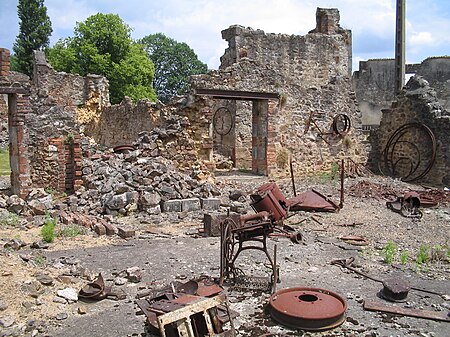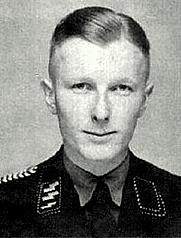Welcome to DU!
The truly grassroots left-of-center political community where regular people, not algorithms, drive the discussions and set the standards.
Join the community:
Create a free account
Support DU (and get rid of ads!):
Become a Star Member
Latest Breaking News
Editorials & Other Articles
General Discussion
The DU Lounge
All Forums
Issue Forums
Culture Forums
Alliance Forums
Region Forums
Support Forums
Help & Search
World History
Related: About this forumOn this day, June 10, 1944, six hundred forty-two men, women, and children were massacred at Oradour-sur-Glane, France.
Some accounts say 643. I'm looking into it.
https://en.wikipedia.org/wiki/June_10
• 1942 – World War II: The Lidice massacre is perpetrated as a reprisal for the assassination of Obergruppenführer Reinhard Heydrich.
• 1944 – World War II: Six hundred forty-two men, women and children massacred at Oradour-sur-Glane, France.
• 1944 – World War II: In Distomo, Boeotia, Greece, 218 men, women and children are massacred by German troops.
• 1944 – World War II: Six hundred forty-two men, women and children massacred at Oradour-sur-Glane, France.
• 1944 – World War II: In Distomo, Boeotia, Greece, 218 men, women and children are massacred by German troops.
Oradour-sur-Glane massacre

Wrecked hardware – bicycles, sewing machines – left in the ruins of Oradour-sur-Glane
Location: Oradour-sur-Glane, France
Date: 10 June 1944
Deaths: 643 killed
Victims: French civilians
Perpetrators: Waffen-SS
Adolf Diekmann
Heinz Lammerding
On 10 June 1944, four days after D-Day, the village of Oradour-sur-Glane in Haute-Vienne in Nazi-occupied France was destroyed when 643 civilians, including non-combatant men, women, and children, were massacred by a German Waffen-SS company as collective punishment for Resistance activity in the area including the capture and subsequent execution of Waffen SS Sturmbannfuhrer Helmut Kämpfe, who an informant claimed had been burned alive in front of an audience. Kämpfe was a highly decorated commander in the 2nd SS Panzer Division Das Reich.
The Germans murdered everyone they found in the village at the time, as well as people brought in from the surrounding area. The death toll includes people who were merely passing by in the village at the time of the SS company's arrival. Men were brought into barns and sheds where they were shot in the legs and doused with gasoline before the barns were set on fire. Women and children were herded into a church that was set on fire; those who tried to escape through the windows were machine gunned. Extensive looting took place.
All in all, 643 people are recorded to have been murdered. The death toll includes 17 Spanish citizens, 8 Italians, and 3 Poles.
Six people escaped the massacre. The last living survivor, Robert Hébras, known for his activism for reconciliation between France, Germany, and Austria, died on 11 February 2023, aged 97. He was 18 years old at the time of the massacre.
The village was never rebuilt. A completely new village was built nearby after the war. President Charles de Gaulle ordered that the ruins of the old village be maintained as a permanent memorial and museum.
Background

Adolf Diekmann, commander of the 4th SS Panzer Grenadier Regiment
In February 1944, the 2nd SS Panzer Division Das Reich was stationed in the Southern French town of Valence-d'Agen, north of Toulouse, waiting to be resupplied with new equipment and fresh troops. Following the Normandy landings in June 1944, the division was ordered north to help stop the Allied advance. One of its units was the 4th SS Panzer Grenadier Regiment "Der Führer". Its staff included regimental commander SS-Standartenführer Sylvester Stadler, SS-Sturmbannführer Adolf Diekmann commanding the 1st Battalion and SS-Sturmbannführer Otto Weidinger, Stadler's designated successor who was with the regiment for familiarisation. Command passed to Weidinger on 14 June.
Early on the morning of 10 June 1944, Diekmann informed Weidinger that he had been approached by two members of the Milice, a paramilitary force of the Vichy Regime. They claimed that a Waffen-SS officer was being held prisoner by the French Resistance in Oradour-sur-Vayres, a nearby village. The captured officer was claimed to be SS-Sturmbannführer Helmut Kämpfe, commander of the 2nd SS Panzer Reconnaissance Battalion (also part of the Das Reich division). Kämpfe was captured by the Maquis du Limousin the day before while traveling in a German army vehicle marked as an ambulance protected by the Geneva Convention.
{snip}
Burning of women and children in the church
{snip}
Murphy report

Escape and Evasion Report No. 866, Evasion in France, 2nd Lt. Raymond J. Murphy, Navigator, 324 Bomb Squadron, 91 Bomb Group (H), 15 August 1944
Raymond J. Murphy, a 20-year-old American B-17 navigator shot down over Avord, France in late April 1944, witnessed the aftermath of the massacre. After being hidden by the French Resistance, Murphy was flown to England on 6 August, and in debriefing filled in a questionnaire on 7 August and made several drafts of a formal report. The version finally submitted on 15 August has a handwritten addendum:
Murphy's report was made public in 2011 after a Freedom of Information Act request by his grandson, an attorney in the United States Department of Justice National Security Division. It is the only account to mention crucifying a baby. Shane Harris concludes that the addendum is a true statement by Murphy and that the town, not named in Murphy's report, is very likely Oradour-sur-Glane.
{snip}

Wrecked hardware – bicycles, sewing machines – left in the ruins of Oradour-sur-Glane
Location: Oradour-sur-Glane, France
Date: 10 June 1944
Deaths: 643 killed
Victims: French civilians
Perpetrators: Waffen-SS
Adolf Diekmann
Heinz Lammerding
On 10 June 1944, four days after D-Day, the village of Oradour-sur-Glane in Haute-Vienne in Nazi-occupied France was destroyed when 643 civilians, including non-combatant men, women, and children, were massacred by a German Waffen-SS company as collective punishment for Resistance activity in the area including the capture and subsequent execution of Waffen SS Sturmbannfuhrer Helmut Kämpfe, who an informant claimed had been burned alive in front of an audience. Kämpfe was a highly decorated commander in the 2nd SS Panzer Division Das Reich.
The Germans murdered everyone they found in the village at the time, as well as people brought in from the surrounding area. The death toll includes people who were merely passing by in the village at the time of the SS company's arrival. Men were brought into barns and sheds where they were shot in the legs and doused with gasoline before the barns were set on fire. Women and children were herded into a church that was set on fire; those who tried to escape through the windows were machine gunned. Extensive looting took place.
All in all, 643 people are recorded to have been murdered. The death toll includes 17 Spanish citizens, 8 Italians, and 3 Poles.
Six people escaped the massacre. The last living survivor, Robert Hébras, known for his activism for reconciliation between France, Germany, and Austria, died on 11 February 2023, aged 97. He was 18 years old at the time of the massacre.
The village was never rebuilt. A completely new village was built nearby after the war. President Charles de Gaulle ordered that the ruins of the old village be maintained as a permanent memorial and museum.
Background

Adolf Diekmann, commander of the 4th SS Panzer Grenadier Regiment
In February 1944, the 2nd SS Panzer Division Das Reich was stationed in the Southern French town of Valence-d'Agen, north of Toulouse, waiting to be resupplied with new equipment and fresh troops. Following the Normandy landings in June 1944, the division was ordered north to help stop the Allied advance. One of its units was the 4th SS Panzer Grenadier Regiment "Der Führer". Its staff included regimental commander SS-Standartenführer Sylvester Stadler, SS-Sturmbannführer Adolf Diekmann commanding the 1st Battalion and SS-Sturmbannführer Otto Weidinger, Stadler's designated successor who was with the regiment for familiarisation. Command passed to Weidinger on 14 June.
Early on the morning of 10 June 1944, Diekmann informed Weidinger that he had been approached by two members of the Milice, a paramilitary force of the Vichy Regime. They claimed that a Waffen-SS officer was being held prisoner by the French Resistance in Oradour-sur-Vayres, a nearby village. The captured officer was claimed to be SS-Sturmbannführer Helmut Kämpfe, commander of the 2nd SS Panzer Reconnaissance Battalion (also part of the Das Reich division). Kämpfe was captured by the Maquis du Limousin the day before while traveling in a German army vehicle marked as an ambulance protected by the Geneva Convention.
{snip}
Burning of women and children in the church
{snip}
Murphy report

Escape and Evasion Report No. 866, Evasion in France, 2nd Lt. Raymond J. Murphy, Navigator, 324 Bomb Squadron, 91 Bomb Group (H), 15 August 1944
Raymond J. Murphy, a 20-year-old American B-17 navigator shot down over Avord, France in late April 1944, witnessed the aftermath of the massacre. After being hidden by the French Resistance, Murphy was flown to England on 6 August, and in debriefing filled in a questionnaire on 7 August and made several drafts of a formal report. The version finally submitted on 15 August has a handwritten addendum:
About 3 weeks ago, I saw a town within 4 hours bicycle ride up [sic] the Gerbeau farm [of Resistance leader Camille Gerbeau] where some 500 men, women, and children had been murdered by the Germans. I saw one baby who had been crucified.
Murphy's report was made public in 2011 after a Freedom of Information Act request by his grandson, an attorney in the United States Department of Justice National Security Division. It is the only account to mention crucifying a baby. Shane Harris concludes that the addendum is a true statement by Murphy and that the town, not named in Murphy's report, is very likely Oradour-sur-Glane.
{snip}
Sat Jun 10, 2023: On this day, June 10, 1942 and 1944, there were three German-led massacres.
Fri Jun 10, 2022: On this day, June 10, 1942 and 1944, there were three German-led massacres.
2 replies
 = new reply since forum marked as read
Highlight:
NoneDon't highlight anything
5 newestHighlight 5 most recent replies
= new reply since forum marked as read
Highlight:
NoneDon't highlight anything
5 newestHighlight 5 most recent replies
On this day, June 10, 1944, six hundred forty-two men, women, and children were massacred at Oradour-sur-Glane, France. (Original Post)
mahatmakanejeeves
Jun 2024
OP
Irish_Dem
(59,772 posts)1. The GOP admires Nazis who committed these crimes.
Karadeniz
(23,559 posts)2. Hollywood dead heads: "Lets make a comedy about Nazis..."